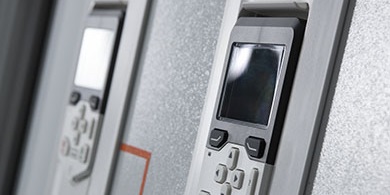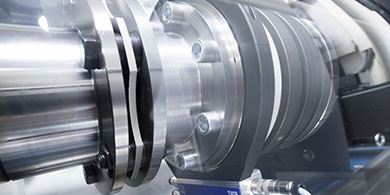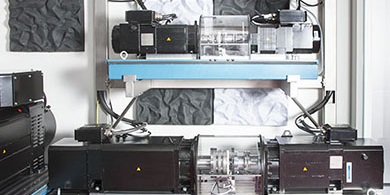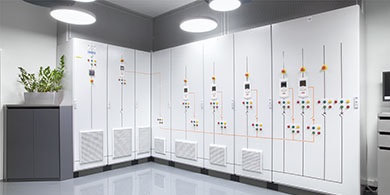Located beside ABB’s Helsinki drives factory, the ABB drives test laboratory is one of the few ABB test facilities that is intended primarily for external customers. The laboratory provides high-precision measurements of drive/motor dynamic performance, loadability and efficiency that enable customers to find an optimal drive system for their application and thus reduce costs, equipment size and energy consumption.
The measurements are obtained using an extremely precise device. In addition, the laboratory makes it possible to verify motor control performance and match customer motors with ABB drives so that customers have an opportunity to rapidly and accurately verify ABB as a new supplier.
Drives are economical choice

Over the past few decades, the number of motors designed for use with drives has increased significantly. Also, drive prices have steadily decreased while quality has improved considerably. At the same time, machine builders and other users have realized that it is economically attractive to use drives.The new ABB drives test laboratory gives customers an opportunity to verify ABB as a new supplier, with a minimum amount of work. Before introducing a new ABB product into serial production, a motor/drive combination can be tested in the drives laboratory. This is an easy and reliable way for customers to find an optimal drive system for their application. (Sometimes, customers play it safe by going for a bigger drive than necessary – along with equally overdimensioned protection and cabling.)
Customer benefits: Optimization and verification

The ABB customer drives test laboratory is an entirely new concept and is primarily aimed at high-volume customers like OEMs (original equipment manufacturers), system integrators and relevant ABB partners in, for example, the machine-building industry.
Before making a significant drives investment, a customer wants to see objective measurements and proven functionality. Previously, customers were unable to test – at least at this level – their motors on ABB premises but now they have an opportunity to obtain accurate measurements of dynamic performance, loadability and efficiency, and use this data to verify their drive systems.
Testing process

The laboratory also makes it possible to verify motor control performance and match customer motors with ABB drives in this respect. This is particularly useful when the customer is making a decision concerning a new product. There had been a strong customer demand for such a service for some years, and months before the laboratory opened there was already a waiting list for test slots.
The customer usually sends his motor to the laboratory a few weeks in advance so that the appropriate test setup can be prepared. A customer team will witness the testing and see the collection of the measurements in real time. These extremely precise measurements ensure that the system is working as specified.
The exact drive system performance needed is now known so an optimal drive system can be chosen or even be tailored to a customer’s application. In other words, customers now have accurate and verified objective measurement data to support their decision making and their purchase process is shortened.
High-precision measurements

One key element of the laboratory is its accurate and reliable torque measurement device, with which the torque of almost any motor up to 385 kW can be measured. There are three setups for three different shaft heights (100, 160 and 250 mm). The load motors are ABB HDP (high dynamic performance) models. The load motor and test motor are each connected to an ABB drive. The load motor simulates the actual load in the customer’s application. As a result, the suitability of the motor/drive combination can be verified and optimized.
In addition to customer-specific motors, all ABB motors can be tested. Moreover, speed, torque and efficiency can be measured at any given operation point and the customer can even define his own test points.
The new laboratory is expected to strengthen ABB’s role as an agile and flexible partner. The facilities now available underline the reality that this type of collaboration with customers –especially those in the machine-building industry –is essential.
Technical perspective
Tests and parameters
– Parameters: electrical and mechanical measurements
– Tests: dynamics, loadability, efficiency at different load points, customizable load points
– How ABB drives work with different settings such as speed adjustments and torque adjustments
Methods
– Electrical power is measured in the network before the ABB test drive.
– The mechanical power is measured between test and load motors.
– With electrical and mechanical power measured, the efficiency of the system can be calculated.
Equipment
– Yokogawa WT3000 precision power analyzer
– Hitec MACC plus high-precision current transformers
– HBM T40B torque sensor
Minimum and maximum values that can be tested
– Three setups: biggest one up to 385 kW; smallest up to 8.2 kW (smallest load point is 25 percent)
– Torque sensor: up to a speed of 20,000 rpm